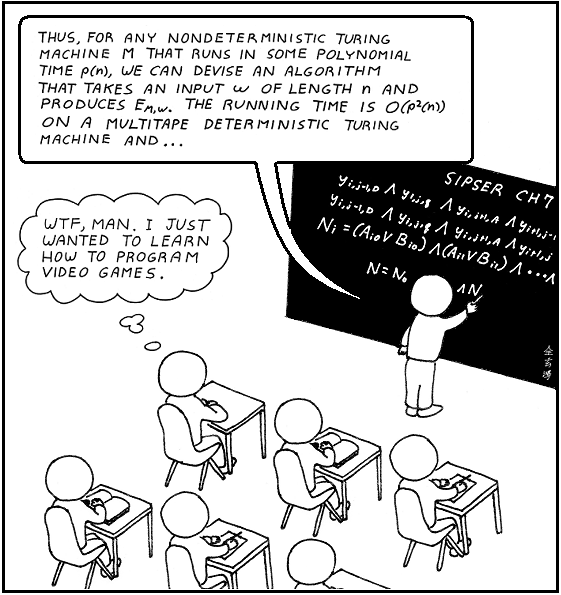August 2018


A little bit about me, go ahead and skip this paragraph to get straight to the content. I'm going to be straight with you this paragraph is basically a sob story followed by a list of how my spirit was crushed and how I managed to persevere through pretty much sheer stubborness. This post was also partially inspired by another TAMU graduate.† We graduated in the same year too. I feel like he should've gotten in touch with career services, but we all know Aggies have moxie!† I have a bachelor of science in computer science but not from Texas A&M. I crammed all of my computer science courses into two years after a change in field, and my GPA suffered for it. But also because I graduated from the major so quickly, it didn't leave me any real time to get internship experience. (That's only partially true, in my undergraduate years I really struggled having the confidence to put myself out there for research and internship opportunities.)† Needless to say I was disadvantaged by the time I graduated. I was too embarrassed to throw my GPA on my resume, and I'm not the type of person lie. Meanwhile students from that other University that won't be named, you know the one, are conveniently located in the heart of Texas' innovation hub and getting internships left and right from the tech giants. I'm sure local TAMU students can relate! Not being geographically located in Austin already puts us at a disadvantage.† But hey, at least Houston is the energy capital of the world and tech is huge in oil and gas, right?
Getting A Tech Job in Healthcare and Oil and Gas Wasn't What I Expected
Takeaway: Work on those database skills I held out hope my entire undergraduate career that I'd find something in† healthcare or oil and gas. It turns out all of the software jobs are very, very proprietary. Not only that there aren't that many openings. It may be easier going for those of you in IT but that isn't my strong suit. What few interview opportunities I did manage to land involved database work. Anecdotally Oil and Gas companies have the resources to use Microsoft SQL (compared to open source Oracle MySQL) so it wouldn't hurt to work on your Microsoft Certifications. But on the other hand Oracle MySQL is free and much more accessible for learners.Trying to Survive on a Theory-Based Curriculum
Takeaway: Do a little bit of market research on trends, at least enough that you don't faux pas like I did. "Do you prefer front-end, back-end, or full-stack?" ...What's a full-stack? Definitely not my best moment, especially since the word full-stack is pretty much everywhere. Along with words like "scrum master" and new technical terms like MongoDB, noSQL, MEAN, LAMP, Angular, VUE, D3, red hat, white hat, etc, it was enough to drive a new graduate crazy. It's like the academic world I came from was completely removed from industry. Worst part is employers don't take your learning ability and strong computer science foundation into account in the hiring process. It's all about what you've done and how long you've done it.
I was so desperate for work that I couldn't commit to one language or technology in fears that I would miss a job opportunity. But at the same time it is impossible to learn it all and I couldn't get myself skilled enough to land a job. I concluded that web development had the lowest barrier of entry because of all the free resources available. I guess it really boils down to your interests! You can't go wrong with C# and Unity is one of the most popular game development platforms.
Just Keep on Pushing! (Literally)
Takeaway: Never stop coding and Git Push your way to your career I graduated at the end of 2014, and I still know a small number of people who never got their career in tech. Like me, they had a hard time of it at graduation. But unlike me they didn't spend all of their evenings coding and sending out resumes until late hours. On the contrary I have a friend who graduated right at the start of the great recession. One of the best things about programming is relatively low start-up costs. This friend straight made himself an expert in C# and landed himself a job after two years of grind. That and if you participate in enough competitions, the employers might come to you instead. I was honestly embarrassed of my code. I never think anything I write is good enough and I keep comparing myself to people with much more experience than me. I've since learned to let that mentality go because I know I was only hurting myself. It's great to compare to improve, but starting at the skill gap and despairing doesn't help anyone least of all yourself. Don't be like me! Have the courage to git push. It's more important to employers to see that you're learning and can at least write code. My favorite coding resources is a topic for another day though, but I have a lot of them!Control Systems Programming Was Kind of a Nightmare
Takeaway: Great career for those with an understanding of hardware, software, and networking. Not ideal if you just want to program. I landed my first job as a control systems programmer. Basically I used a very proprietary language (read: not marketable) and the job was very hardware dependent. When I first interviewed I thought it would be the best thing ever. I have an interest in robotics, I wanted to get better in hardware, this is great. In reality I ended up having to go to job sites, sometimes in terrible conditions and for long hours. Also when you're programming you'll very rarely run into issues where your hardware is broken or not communicating. As a control systems programmer sometimes you have to troubleshoot for the hardware and the network as well. Imagine your code not working and you having to figure out if the compiler's broken. Maybe you'll love it! But it wasn't for me.Still Stuck? Get your Master's
Takeaway: Nothing says clean slate like a master's. "Master's preferred" was in almost all the job descriptions from my midnight applications, even for entry level jobs. I couldn't help but wonder how many opportunities I lost to people who held master's degrees.† I was fed up. Which program you choose is going to be entirely up to you. Maybe you want to do more computer science but I personally fell in love with Data Analytics. To me, analytics is the perfect mix of programming and mathematics. After taking a few post-baccalaureate statistics courses I landed my dream job as a Software Developer where believe it or not I use the new skills every day. I wish you or your loved ones (if you're going to share this post) the best of luck! The biggest takeaway here is to not give up. Keep (git) pushing and you'll find your opportunity. Technology is still a growing and high demand field.---
Jennifer Cai
Jennifer is a Masters student in the College of Science's Analytics program.